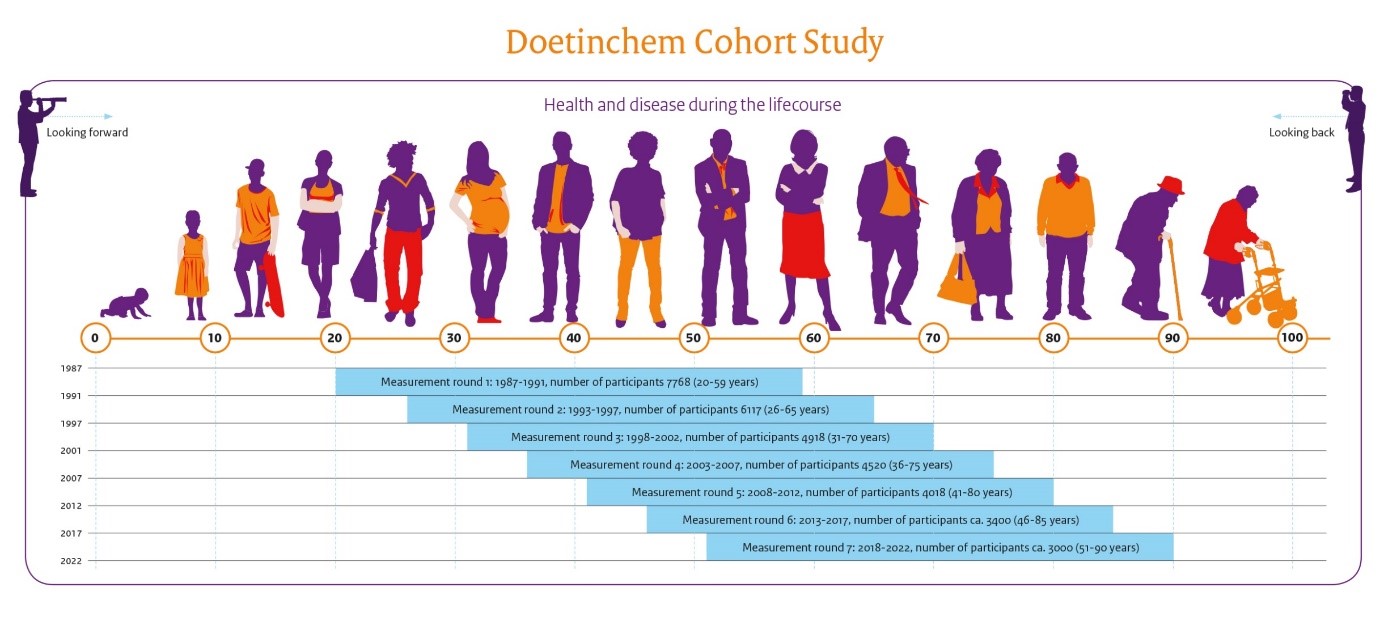Health, Lifestyle and Life Course:
- The Doetinchem Cohort Study is a prospective longitudinal study on lifestyle and other determinants of health and disease as they develop over the life course and during ageing, with individual data covering 25 years. At present, the participants of the study have been followed for almost 30 years.
- It started in 1987 as a monitoring study on cardiovascular disease risk factors, with an age-sex stratified sample from the inhabitants of Doetinchem, (20-59 years), a provincial town in The Netherlands. Of those invited, 12.404 (62%) participated in the baseline examination.
- Two-third of those assessed at baseline (n=7768) were invited for a first follow-up measurement in 1993-1997 (round 2: n=6117), and every five years since. Currently, round 7 is ongoing, covering the period 2018-2022. The average response rate overall rounds is 78%.
- A broad range of factors, including lifestyle, biological, health (physical and psycho-social), wellbeing, presence of disease, and care factors are assessed. Some unique characteristics of the study are: a broad age range is covered; biological materials (including blood) are collected at every measurement round and stored (biobank); extensive lung function measurements and cognition tests from a young age onwards.
Research questions: The data of the study are increasingly used for studying the changes over the life course in life style and health, the relations between risk factors and the occurrence of disease, and generational differences.
The Doetinchem Cohort Study is carried out by the National Institute for Public Health and the Environment in collaboration with the Municipal Health Service in Doetinchem and supported by the Dutch Ministry of Health, Welfare and Sport.
Collaboration and data access: We welcome collaboration. If you want to use the available data, please contact Professor WMM Verschuren, (monique.verschuren@rivm.nl) or HSJ Picavet, PhD (susan.picavet@rivm.nl).
Overview of the data collected/available (most collected at each round):
Lifestyle factors: smoking, physical activity by questionnaire and Actigraphb, sedentary timeb, alcohol consumption, sleep (hours and qualitya), chronotypeb
Biological factors: standing height, weight, body mass index, waist and hip circumference, blood pressure (arm and ankle), total and HDL-cholesterol, blood glucose, blood samples available /stored for future analyses), lung function, for women: reproductive history , menstruation history, and contraception use, heel bone massa, accumulation of Advanced Glycation Endproducts (AGEs) in de skinb, urine sample (storage for future research questions)a , genetic data and metabolomics (Nightingale platform).
Functioning: quality of life (SF36), cognitive functioning (global and memory, speed, flexibility), hearing and eyesight issues, handgriptesta, balance testa, chair testa
Psycho-social aspects: depressive symptomsa, lonelinessa, social supporta, health literacyb, perception of living environmentb (e.g. possibilities for recreational physical activity)
Chronic diseases: diabetes, cardiovascular disease (claudication, stroke, heart disease), migraine, musculoskeletal pain, cancer, asthma and COPD, (history of) fracturesa, list of chronic conditions (incl. incontinence, falling, osteoarthritis)a
Divers: family history for diseases (heart diseases, fracturesa, dementiab, menopauseb), oral healthb (teeth and gums), (historical) sound pollutionb , contact with (small) childrenb, consumption of tap waterb
Health careb: Use of health care services, self-management, giving and receiving informal care, acceptance of vaccination
Background characteristics: age, sex, marital status, educational level, work status and household characteristics, (historical) shift workb, participationb (engagement in societal activities), birth weightb
Registry linkages: mortality, hospital discharge by diagnosis, cancer register and pharmacy register
a included from round 5 (2008-2012) onwards,
b included in round 6 (2013-2017) additionally
References
Picavet, H.S.J., Blokstra, A., Spijkerman, A.M.W., Verschuren, W.M.M. Cohort Profile Update: The Doetinchem Cohort Study 1987-2017: Lifestyle, health and chronic diseases in a life course and ageing perspective (2017) International Journal of Epidemiology, 46 (6), pp. 1751 and 1751a-1751g.
Verschuren, W.M.M., Blokstra, A., Picavet, H.S.J., Smit, H.A. Cohort profile: The Doetinchem Cohort Study (2008) International Journal of Epidemiology, 37 (6), pp. 1236-1241.

